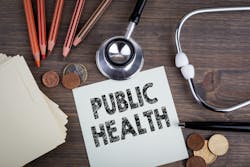Mount Sinai Medical School Creates Department of Public Health
The Icahn School of Medicine at Mount Sinai had established a new Department of Public Health under the leadership of Rosalind J. Wright, M.D., M.P.H., the Horace W. Goldsmith Professor in Children’s Health Research at Icahn Mount Sinai.
The Department of Public Health will bridge the school’s existing programs in environmental medicine, population health, global health, infectious disease, climate science, digital health, data science and artificial intelligence, community engagement, and health equity, among other areas, to modernize and advance innovations in public health response needed to address the mounting challenges faced by the nation’s health system and society.
“For too long, there’s been a disconnect between the research and educational focus in schools of public health and schools of medicine,” Wright said in a statement. “Our changing climate, health disparities, social stressors, pollution, access to healthy food, and other pressing societal issues are traditionally studied in public health schools rather than medical schools. At Mount Sinai, we realize that to achieve the best possible health outcomes for the diverse communities and patients we serve, we have to think about them at the population and community levels where patients live their daily lives, and not solely think at the physician-patient level when they enter the clinic. That can happen much more readily when everyone sits side by side and takes on these challenges together as a team.”
The Department of Public Health will take a trans-disciplinary team approach to identifying disease patterns and risk and resiliency factors across the communities Icahn Mount Sinai serves locally, regionally, and globally, in order to develop and implement the most effective interventions and treatments for all. The school’s public health faculty will focus on continuing to address recalcitrant health disparities, and the social and environmental factors at the community and individual levels that contribute to them.
“When you think about the factors in our lives that affect health—the foods we eat, the products we use, the air we breathe, the psychological stress we experience—these things are getting into our bodies, shaping our biology, and translating into health outcomes,” Wright added. “They are not just public health issues. These factors affect patients too and have significant impacts on their treatments and disease progression. We have not yet factored them into our treatment programs, but doing so will have profound benefits.”
“We used to try to understand the effects by looking at one factor at a time, like ‘What’s the effect of lead on the brain?’ But the world doesn’t work that way. We are exposed to multiple risk factors at once. We take in many different things at once, and we have to understand their joint effects by looking at health threats as comprehensively as possible, not just one by one,” added Wright.
The new department will address the current and emerging challenges of aging public health infrastructures, pandemics, systemic health disparities, access to health care, climate change, and rapidly changing disease patterns, while advancing research and implementation opportunities in genomics, exposomics, and vaccines leveraging data science and artificial intelligence tools. The next generation of scholars, researchers, and clinicians will be trained in how to incorporate data-driven methods into their practices, while working in partnership with communities, patients, nonprofit organizations, and health department and other governmental officials.
“I'm a critical care physician by training, and I like working with teams to address complex problems,” Wright said. “I approach public health in this context to achieve the ultimate goal of better outcomes for our patients and communities.”
“Mount Sinai is well recognized for its cutting-edge research across public health disciplines, which are integrated into the healthcare system, and integral to the communities that Mount Sinai serves,” said Annetine Gelijns, Ph.D., Chair of Population Health Science and Policy at Icahn Mount Sinai, whose department will work closely with the Department of Public Health. “There is a growing need for academic medical students who combine teaching, research, and treating patients in their first year after medical school. These individuals will integrate public health more directly into translational sciences as they have the training to improve health outcomes for our patients. This new department, working alongside Mount Sinai’s established expertise in related areas, offers the perfect environment for training the next generation of public health professionals.”
The department will integrate several graduate programs and research efforts across entities at Icahn Mount Sinai, including the Departments of Environmental Medicine, Population Health Science and Policy, and Global Health and Health Systems Design; the Arnhold Institute for Global Health; the Institute for Transformative Clinical Trials; the Institute for Climate Change, Environmental Health, and Exposomics Health; and the Institute for Health Equity Research, among many others.
Wright will continue in her role as Director of Conduits, the Clinical and Translational Science Award (CTSA) Program at Mount Sinai, which will serve to better integrate the school’s programs in clinical and public health research.
Sponsored Recommendations


